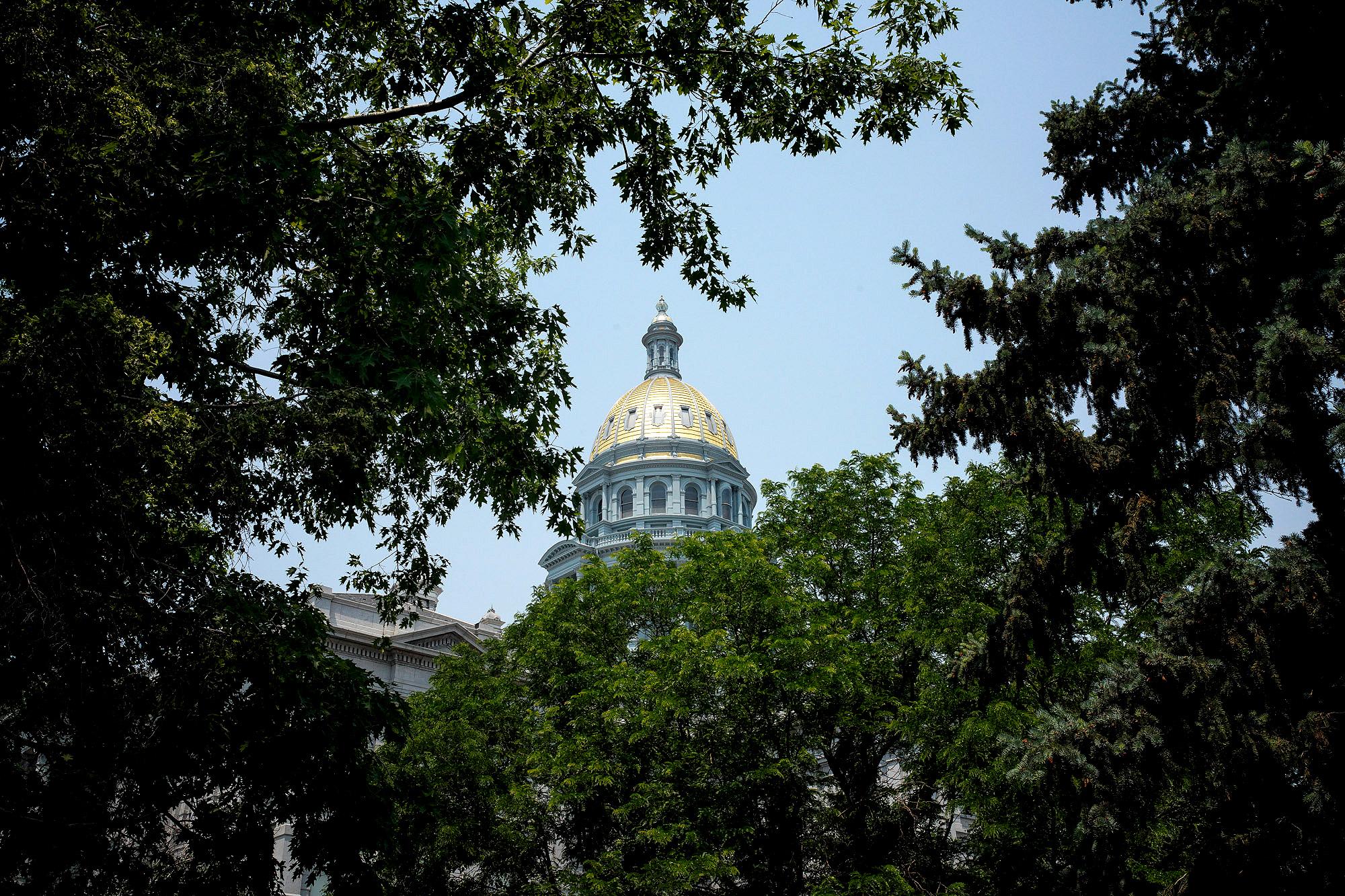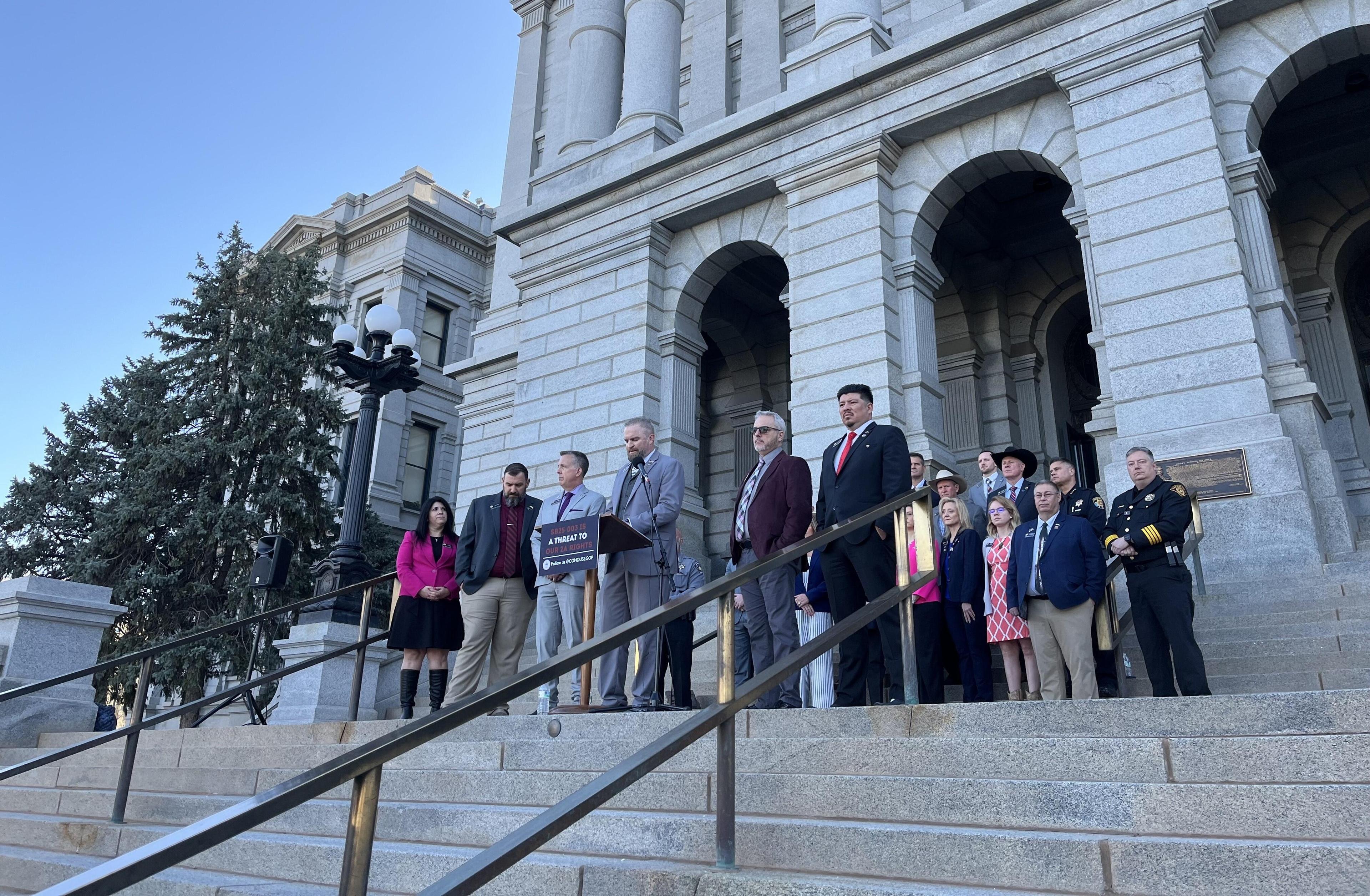
Updated 3 p.m., Dec. 27, 2022
Editor's Note: On December 27th, the governor officially declared the results of the statewide ballot questions, the final step in the process allowing the ones that passed to start taking effect.
Passed:
Amendment D — Shift judges to new 23rd judicial district
This amendment, which continues the process of creating Colorado’s first new judicial district in decades, was approved by voters by nearly 35 points.
As the state’s largest district by population, the 18th was becoming unwieldy, and so in recent years local leaders and state lawmakers agreed to split off Douglas, Elbert and Lincoln counties into their own district.
This amendment allows judges who were appointed to seats in the 18th judicial district to automatically move to the 23rd when the new district becomes official. As a constitutional amendment, it needed at least 55 percent of the vote to pass.
Amendment E: Extend homestead property tax exemption to Gold Star spouses
Voters overwhelmingly supported Amendment E, with 88 percent voting in favor.
This amendment allows gold star spouses to claim a property tax break that exempts 50 percent of the first $200,000 of their home’s value from taxation if they’ve lived there for at least a decade.
A gold star spouse is the surviving husband or wife of a military member who died in the line of duty or from a condition related to their service. The state estimates around 490 gold star spouses will be eligible for the exemption if this amendment passes. As a constitutional amendment, it needed at least 55 percent of the vote to pass.
Proposition FF: Healthy meals for all public school students
Colorado voters appear approved Proposition FF by around 13 points.
It eliminates some tax deductions, effectively raising taxes on Colorado households that make more than $300,000 a year. The money will go to pay for universal free school lunches, as well as to raise wages for cafeteria workers and provide grants to buy more school lunch ingredients locally.
Advocates for these policies originally tried to pass them directly at the legislature, but lawmakers instead chose to put it up for a public vote.
Proposition GG: Giving voters more information about proposed tax changes
Proposition GG requires that ballot measures that change income tax rates make it clear both during signature gathering and voting how they will affect different income brackets. It passed with support from more than 70 percent of voters.
Under the policy, a table showing the relative savings for different income brackets must be included both on petitions and the ballot itself (such a table is already generally included in the Blue Book).
Democratic lawmakers put this proposition on the ballot over the objections of Republicans who argued it’s just intended to discourage voters from supporting future tax cuts.
Proposition 121: Colorado state income tax cut
Under Proposition 121, Colorado’s flat income tax rate will decline from 4.55 percent to 4.40 percent. Savings for taxpayers varies based on income. Someone making less than $40,000 a year will save at most $37, while people earning more than $200,000 will save more than $200. It passed with support from 65 percent of voters.
Proponents point to Colorado’s recent surpluses, with the state sending required refund checks to taxpayers, as evidence the income tax rate is unnecessarily high. However, opponents warned that cutting the rate will force even deeper budget cuts the next time the state goes into recession.
Proposition 122: Access to natural psychedelic substances
Proposition 122 makes it legal to grow, gift and use psychedelic mushrooms and also decriminalizes three other psychedelic compounds — DMT, ibogaine and mescaline — for people over 21 years old.
It passed by a margin of six points.
Though the measure does not allow for storefront sales, it does create a path for licensed ‘healing centers’ where people can consume psilocybin in a regulated setting. Many of the details of how these centers will operate and what kind of training will be required for staff will be left up to regulators and a panel of advisers.
Denver decriminalized mushrooms in 2019, but Oregon is the only state so far to have gone this far in the direction of legalized psychedelics.
Proposition 123: Dedicate tax revenue to affordable housing
After passing by five points, Proposition 123 will require lawmakers to start earmarking about two percent of income tax revenues for a variety of affordable housing efforts. For the first fiscal year it's in effect that would equal nearly $300 million for things like constructing income-restricted buildings, funding housing vouchers and more.
The set-aside would be exempt from the spending cap imposed by Colorado’s Taxpayer’s Bill of Rights. That means, in years when the state brings in a lot of money, this funding would be deducted from refunds that would otherwise be directly paid to taxpayers. However in leaner years, the law would require the same amount of money be directed to affordable housing, even if other parts of state spending, such as on education or prisons, is being cut. It needs 50 percent of the vote to pass.
Proposition 125: Allowing grocery and convenience stores to sell wine
This proposition was essentially split evenly by Monday, with 50.37 in favor and 49.63 against, a difference of roughly 17,500 votes.
Under Proposition 125, Colorado will join more than two dozen other states that already allow grocery and convenience stores to sell wine.
Grocery chains argued the change is more convenient for consumers, allowing them to make one stop for dinner, and the wine they serve with it. But independent liquor stores argued the change could make them unprofitable, forcing them to close and eventually leading to fewer wine options for shoppers. It would will need 50 percent of the vote to pass.
Failed:
Amendment F: Changes to charitable gaming operations
Amendment F, which applied to charities and nonprofits that use bingo or raffles to raise money, lost by a large margin, with nearly 60 percent of people voting against it.
It would have allowed organizations to pay their game operators, instead of relying solely on volunteer labor. That pay would be limited to minimum wage until mid-2024, after which nonprofit organizations and workers could decide on a pay rate.
It also would have shortened the time that a nonprofit organization must be in continuous operation in Colorado before it could apply for a bingo-raffle license from five years to three. Additionally, Amendment F authorized the state legislature to decide a new time period requirement beginning in 2025. It would have needed 55 percent of the vote to pass.
Proposition 124: Allows expansion of liquor store chains
This proposition failed by 15 points.
Backers had hoped to rewrite the Colorado law that currently restricts a single owner from operating more than three liquor store locations in the state. Proposition would have gradually lifted that cap, to eventually allow unlimited locations.
The biggest proponent — and main financial backer — for Prop 124 was Total Wine and More, a national chain with hundreds of outlets around the country. It was also supported by some local liquor stores, like Applejack Wine and Spirits in Wheat Ridge, who's owners had hoped expansion would keep them competitive with grocery stores, more and more of which will be licensed to sell wine and spirits in the future.
However, the state’s smaller liquor stores feared that chains, with their greater buying power and ability to negotiate discounts from distributors, would have been able to undercut their prices and run them out of business.
Proposition 126: Third-party delivery of alcoholic beverages
Prop 126 failed by just over 2 points. It would have allowed third-party delivery companies — think DoorDash or Instacart — to deliver alcoholic beverages. It would have also permanently allows restaurants to include alcohol in takeout and delivery orders (they’re doing it currently under a law that expires in 2025). Twenty-six other states allow alcohol to be delivered by third parties.
Under the proposition, third-party delivery services would have had to have an internal or external security process for drivers who deliver alcohol. Those would have involved checking identification and refusing delivery to underage or already intoxicated people.









